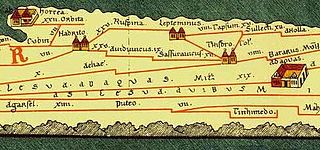See also
- Sallust (horse), (1969-87), thoroughbred racehorse
- House of Sallust, in the ancient Roman city of Pompeii
The names Sallustius/Saloustios and their vernacular variants Sallust(e) have been borne by many people:

Gaius Sallustius Crispus, usually anglicised as Sallust, was a historian and politician of the Roman Republic from a plebeian family. Probably born at Amiternum in the country of the Sabines, Sallust became a partisan of Julius Caesar, circa 50s BC. He is the earliest known Latin-language Roman historian with surviving works to his name, of which Conspiracy of Catiline on the eponymous conspiracy, The Jugurthine War on the eponymous war, and the Histories remain extant. As a writer, Sallust was primarily influenced by the works of the 5th-century BC Greek historian Thucydides. During his political career he amassed great and ill-gotten wealth from his governorship of Africa.
The gens Acilia was a plebeian family at ancient Rome, that flourished from the middle of the third century BC until at least the fifth century AD, a period of seven hundred years. The first of the gens to achieve prominence was Gaius Acilius, who was quaestor in 203 and tribune of the plebs in 197 BC.
The gens Gabinia was a plebeian family at ancient Rome. Members of this gens first appear in the second century BC. The nomen derives from the city of Gabii, east of Rome.
The gens Baebia was a plebeian family at ancient Rome. The first member of the gens who obtained the consulship was Gnaeus Baebius Tamphilus, in 182 BC. During the later Republic, the Baebii were frequently connected with the patrician family of the Aemilii.

Domitia was the oldest child of Antonia Major and Lucius Domitius Ahenobarbus, and the oldest granddaughter to triumvir Mark Antony by Octavia Minor, a great-niece of the Roman Emperor Augustus, first cousin once removed to the Emperor Caligula, first cousin to the Emperor Claudius, maternal aunt to the Empress Valeria Messalina, and paternal aunt to Emperor Nero.
Gaius Sallustius Passienus Crispus was a prominent figure in the Roman Empire during the first century. He held the consulship twice, and was stepfather of the future emperor Nero.

Bocchus, often referred to as Bocchus I for clarity, was king of Mauretania from c. 111 – 80 BCE. He was father-in-law to the Numidian king Jugurtha, with whom he initially allied against the Romans in the Jugurthine War, a lengthy and indecisive conflict.

Leptis or Lepcis Parva was a Phoenician colony and Carthaginian and Roman port on Africa's Mediterranean coast, corresponding to the modern town Lemta, just south of Monastir, Tunisia. In antiquity, it was one of the wealthiest cities in the region.
Crispus was a Caesar of the Roman Empire.

Saturninius Secundus Salutius was a Roman official and Neoplatonist author. A native of Gaul, he had a successful career as a provincial governor and officer at the imperial court, becoming a close friend and adviser of the Emperor Julian. Salutius was well versed in Greek philosophy and rhetoric, and had a reputation for competence and incorruptibility in office. He authored a Neoplatonic religious treatise titled On the Gods and the Cosmos, in support of Julian's pagan reaction against Christianity.
Lucius Passienus Rufus was a Roman senator and a novus homo of some oratorical talent. He was consul in 4 BC as the colleague of Gaius Calvisius Sabinus.
The gens Septimia was a minor plebeian family at ancient Rome. The gens first appears in history towards the close of the Republic, and they did not achieve much importance until the latter half of the second century, when Lucius Septimius Severus obtained the imperial dignity.
The gens Hirtuleia was a minor plebeian family of equestrian rank at ancient Rome, which appears in history during the final century of the Republic, and under the early Empire.
The gens Mallia was a plebeian family at ancient Rome. Due to its relative obscurity, the nomen Mallius is frequently, but erroneously amended to the more common Manlius. The only member of this gens to obtain any of the higher curule magistracies under the Republic was Gnaeus Mallius Maximus, consul in 105 BC.
The gens Passiena, occasionally written Passienia, Passenia, Passennia, or Passenna, was a plebeian family at ancient Rome, originally of equestrian rank, but at least one member was later admitted to the patriciate. Members of this gens appear in history from the early years of the Empire down to the third century, and several obtained the consulship, beginning with Lucius Passienus Rufus in 4 BC.
The gens Pomptina was a minor plebeian family at ancient Rome. The gens is best known from Gaius Pomptinus, praetor in 63 BC, who helped suppress the conspiracy of Catiline, and later defeated the Allobroges. Few of the Pomptini appear in history, but others are known from inscriptions.
The gens Sallustia, occasionally written Salustia, was a plebeian family at ancient Rome. Members of this gens are first mentioned in the time of Cicero, and from that time they attained particular distinction as statesmen and writers. The most illustrious of the family was the historian Gaius Sallustius Crispus, who wrote valuable works on the Jugurthine War and the Conspiracy of Catiline, which still exist.
The gens Tituria was an obscure plebeian family at ancient Rome. Few members of this gens appear in history, of whom the most famous is Quintus Titurius Sabinus, one of Caesar's legates during the Gallic Wars. Other Titurii are known from inscriptions.
The gens Turpilia was a minor plebeian family at ancient Rome. Members of this gens first came to prominence during the second century BC, with the dramatist Sextus Turpilius, and Titus Turpilius Silanus, one of the Roman commanders during the Jugurthine War. The only member to attain the consulship was Lucius Turpilius Dexter, in 81 BC.
The gens Urbinia was an obscure plebeian family at ancient Rome. Only a few members of this gens are mentioned by Roman writers, but others are known from inscriptions.